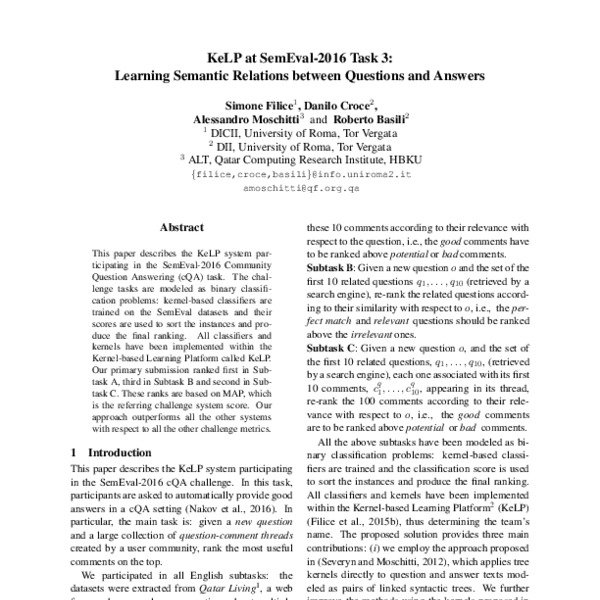
The training, development and test datasets are a based on a corpus of news in Spanish related to the Covid-19 domain.
#SEMEVAL 2015 TASK3 FULL#
The systems will get a full news article and a question, and must find the shortest spans of text in the article (if they exist) that answer the question. We propose a task for developing question answering systems that can answer questions based on news articles written in Spanish. In this task we address the problem of answering questions by extracting answers from a set of documents. Each of these stages has its own challenges, and the whole task requires a successful outcome in each of them and in their integration. Open domain question answering involves two main stages: a) obtaining the relevant documents, generally using methods from the Information Retrieval field (IR) (Manning, 2008), possibly one of the most widely studied topics in NLP, with web search engines as their most noticeable product, b) extracting the answer from those documents. Question Answering (QA) is a classical Natural Language Processing task (Jurafsky, 2021), and can be divided into two main categories: semantic analysis, where the question is transformed to a query to a knowledge database and open domain question answering, where, starting from a question written in natural language and a set of documents, the answer to the question is obtained using information retrieval and information extraction techniques. The Codalab page for the competition is available. The competition is over, the evaluation results have been published. This task is part of IberLEF 2022, and is organized by Grupo PLN-UdelaR News To unsubscribe from this group and stop receiving emails from it, send an email to semeval-absa+unsubscribe to the shared task QuALES - Question Answering Learning from Examples in Spanish, a task to automatically find answers to questions in Spanish from news text. You received this message because you are subscribed to the Google Groups "SemEval-ABSA" group. Maria Pontiki (“Athena” Research Center, Greece) John Pavlopoulos (Athens University of Economics and Business, Greece) Harris Papageorgiou ("Athena" Research Center, Greece) Suresh Manandhar (University of York, UK)

Ion Androutsopoulos (Athens University of Economics and Business, Greece)ĭimitris Galanis (“Athena” Research Center, Greece) The Semeval-2015 Task 12 website includes further details on the training data, evaluation, and examples of expected system outputs: Įmail: semeval-absa SemEval workshop: June 4-5, 2015 (co-located with NAACL-2015 in Denver, Colorado) Information about the domain adaptation dataset of Subtask 2 (out-of-domain ABSA) will be provided later.Įvaluation period starts: December 5, 2014Įvaluation period ends: December 22, 2014 Additional datasets will be provided to evaluate the participating systems in Subtask 1 (in-domain ABSA). Two datasets of ~550 reviews of laptops and restaurants annotated as above are already available for training. The gold annotations for Slot1 will be provided and the teams will be required to return annotations for Slot 3 (sentiment polarity) only. The participating teams will be asked to test their systems in a previously unseen domain for which no training data will be made available.
#SEMEVAL 2015 TASK3 PORTABLE#
It is extremely portable and easily connects to WIFI at the library and elsewhere. Some examples highlighting the required information follow:Ī. The inventories of entity types and attribute labels are described in the annotation guidelines see. Each E#A pair is considered an aspect category of the given text. laptop, keyboard, operating system, restaurant, food, drinks) and attribute labels (e.g. E and A should be chosen from predefined domain-specific inventories of entity types (e.g. Identify every entity (E) and attribute (A) pair (E#A) towards which an opinion is expressed in the given text. Given a review text about a laptop or a restaurant, identify the following information: ABSA15 consists of the following subtasks. Furthermore, ABSA15 will include an out-of-domain subtask, involving test data from a domain unknown to the participants, other than the domains that will be considered during training. Also, ABSA15 consolidates the four subtasks of ABSA14 within a unified framework. However, unlike ABSA14, the input datasets of ABSA15 will contain entire reviews, not isolated (potentially out of context) sentences.


ABSA15 will focus primarily on the same domains as ABSA14 (restaurants and laptops). This task (ABSA15 for short) is a continuation of SemEval 2014 Task 4 (ABSA14, ). SemEval 2015 Task 12 - Aspect Based Sentiment Analysis


 0 kommentar(er)
0 kommentar(er)
